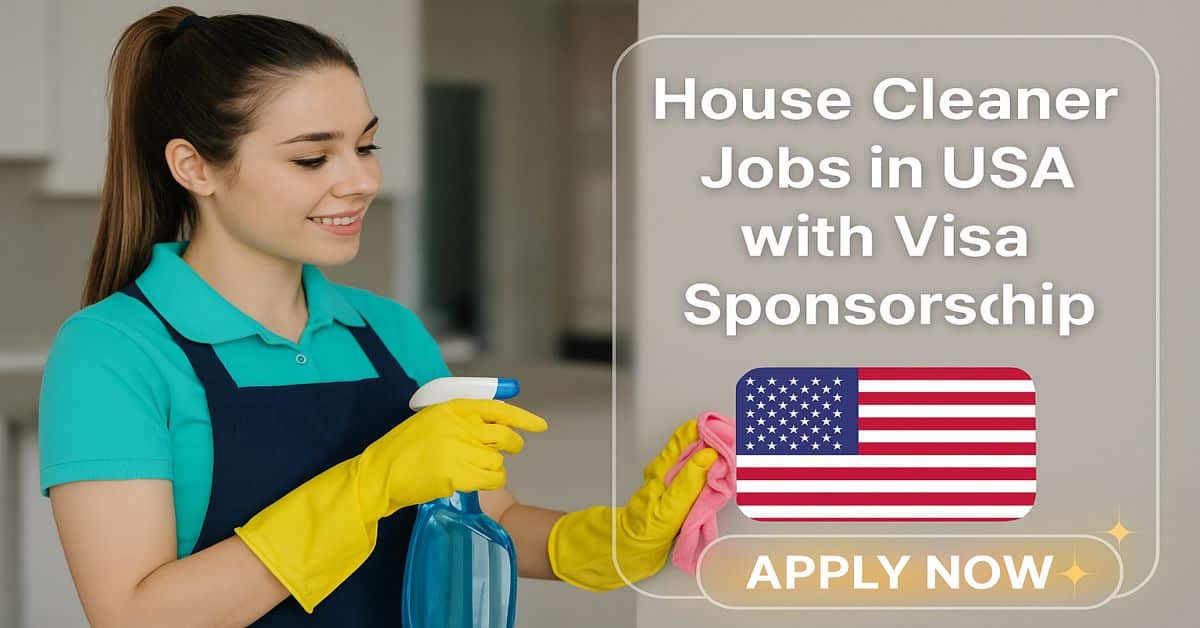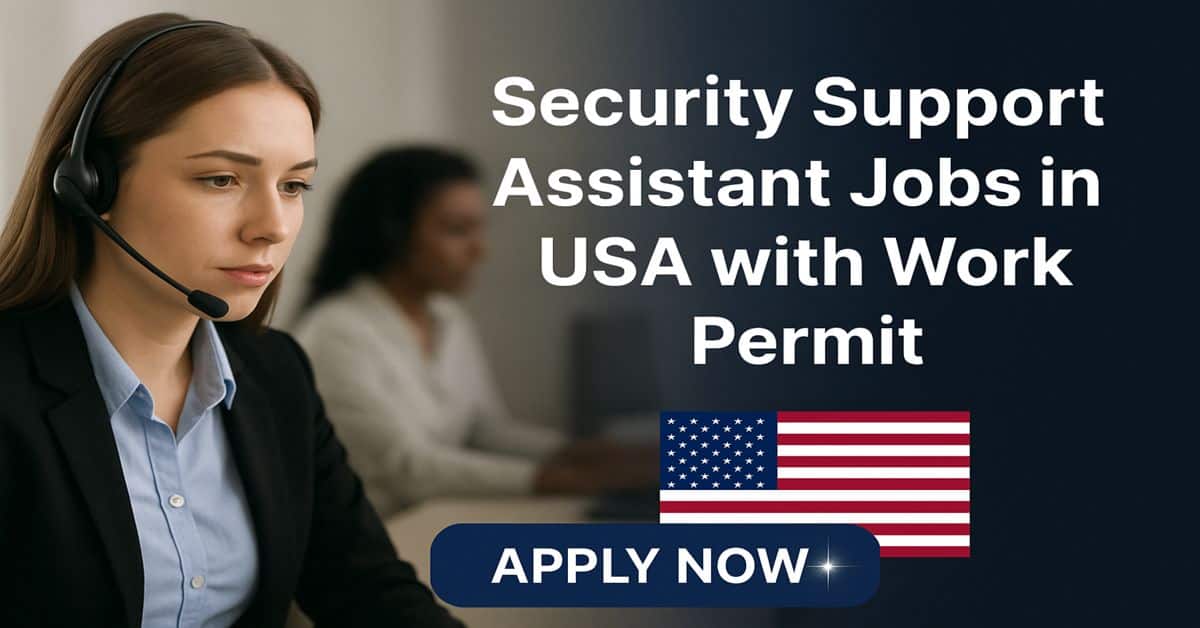J1 Visa Sponsorship Jobs in USA for Foreigners – Apply Now
We will examine the opportunities and obstacles that foreign laborers encounter when seeking employment in the United States, which is a sponsor of J-1 visas. The J1 visa program, which is also referred to as the Exchange Visitor Program, enables international visitors to the United States to engage in labor and gain insight into other cultures. The J1 visa’s requirements, benefits, and limitations, as well as the resources and steps that foreign job seekers can utilize to locate sponsors and secure employment in the United States, will be the subject of our discussion.
A J-1 visa is a non-immigrant visa that enables foreign nationals to engage in cultural and educational exchange activities in the United States. The J-1 program offers two types of visas:
- J-1 academic: This category is reserved for individuals who have participated in cultural and educational exchange programs that have been authorized by the U.S. Department of State. This encompasses summer work and travel programs, au pair programs, and exchange programs for high school and college students.
- J-1 professional: Individuals who are designated by the U.S. Department of State to participate in work-and-study exchange programs are included in this category. This encompasses apprenticeships, grants, and training programs.
What is a J1 Visa?
A J-1 visa is a non-immigrant visa that the United States issues to exchange visitors, professors, and study scholars who are participating in cultural exchange programs in the United States, such as medical or business training.
The J1 visa is a trade visitor visa that enables individuals to participate in a variety of trade programs in the United States. These courses may be professional, cultural, or educational. J1 visas are typically funded by government-approved organizations or institutions that serve as program sponsors.
Benefits of J1 Visa Sponsorship Jobs in USA for Foreigners:
- Cultural Exchange: The J1 visa is specifically intended to facilitate cultural exchange, enabling individuals to engage with American culture while simultaneously expressing their own.
- Diverse Employment Opportunities: It encompasses a broad spectrum of employment categories, such as internships, traineeships, teaching, and research, which allows participants to acquire professional experience in a variety of fields.
- Networking Opportunities: The opportunity to network with professionals in the United States through a J1 visa may result in future job opportunities and career advancement.
- Skill Development: Participants have the opportunity to cultivate their professional skills in a U.S. work environment, which will enhance their resumes and improve their future employment prospects in both the U.S. and abroad.
- Visa Duration Flexibility: The duration of J1 visas can vary from a few months to several years, depending on the program, providing a degree of flexibility in terms of work and learning time.
- Dependents’ Visa: In specific circumstances, J1 visa holders are permitted to bring their spouse and children (under the J2 visa) to remain together while the holder engages in employment or training.
- Change in Visa Status: Although not always guaranteed, J1 visa holders may have the opportunity to transfer their visa status to another category, such as an H1B visa for long-term employment..
- Travel Flexibility: J1 visa holders are permitted to travel in and out of the United States during their stay, which enables them to explore a greater portion of the nation.
List of J1 Visa Sponsorship Jobs in USA for Foreigners:
- B2B Product Marketing Manager – AI (F/M/X)
- [J1-VISA Internship] Chef at Casa Neos – New Opening in Miami (USA)
- Electrophysiology
- Family Practice-OB
- Springfield, VT General Surgeon
- J1 Visa Cook I
- Full-Time Family Practice-OB
- Quality Supervisor
- Gastroenterology Opening in New York
- Corporate Recruiter, Clubs
Purpose of J1 Visa Program:
J-1 visas are non-immigrant visas that enable foreign nationals to engage in educational and cultural exchange programs in the United States. By providing individuals from the United States and other countries with the opportunity to learn about and share their respective cultures, the J-1 visa program aims to foster a greater understanding between them.
The J-1 program provides two types of visas: J-1 A and J-1 B.
- J-1 academic: This category is reserved for individuals who have been accepted into cultural exchange and training programs that have been authorized by the U.S. Department of State. This encompasses summer work and travel programs, au pair programs, and exchange programs for high school and college students.
- J-1 professional: This category encompasses individuals who are enrolled in work-and-study exchange programs that have been authorized by the U.S. Department of State. This encompasses apprenticeships, grants, and training programs.
The J-1 visa program is advantageous for both the United States and its participants. The J-1 visa program provides participants with the chance to acquire valuable work experience, enhance their language skills, and receive insight into American culture. The J-1 visa program is a means for foreign nationals to gain insight into American culture and values, while also assisting the United States in the identification of talented and ambitious foreign individuals.
Check Also: Tech Companies Jobs in USA for Foreigners – Apply Now
Eligibility Criteria for J1 Visa Sponsorship Jobs in USA for Foreigners:
Different requirements must be met by applicants for a J-1 visa, depending on the program in which they desire to enroll. Nevertheless, to be considered eligible, all applicants must meet certain general criteria. The following are the items:
- Citizenship: To qualify for a J-1 visa, applicants must be citizens of a country that participates in the program.
- Age: Programs have varying minimum age requirements. Nevertheless, the majority of educational institutions only permit pupils who are at least 18 years old.
- Education: the minimum level of education required differs by class. Nevertheless, the majority of programs only accept applicants who possess a high school diploma or an equivalent.
- English proficiency: Candidates must exhibit their capacity to comprehend and articulate the language.
- Health: Applicants must be in outstanding physical condition and free of communicable diseases.
- Sponsor: The applicant’s sponsor must be approved by the U.S. Department of State.
In addition to the general eligibility requirements, each institution has its own set of requirements for applicants. For example, au pair candidates must be between the ages of 18 and 26 and have prior experience working with children. Applicants for internship programs must possess an exceptional academic record and be accepted by a college or university.
Contact the school’s sponsor to register for a J-1 visa. Additional information regarding eligibility requirements will be provided by the program’s sponsor.
Here are additional requirements that J-1 visa applicants must fulfill:
- Financial assistance: Applicants must demonstrate that they have the necessary funds to sustain themselves during their time in the United States.
- No criminal history: Applicants must be devoid of any criminal history.
- No serious health problems: To participate in the program, individuals must not have any severe health issues that would impede their ability to do so.
J1 Visa Categories:
The J-1 visa is eligible for 15 job and/or program categories:
- Au Pair
- Camp Counselor
- College and University Student
- Secondary School Student
- Government Visitor
- International Visitor
- Physician
- Professor
- Research Scholar
- Short-Term Scholar
- Specialist
- Summer Work Travel
- Teacher
- Trainee
- Intern
Application Process for J1 Visa Sponsorship Jobs in USA for Foreigners:
The application process can commence once you have secured a sponsor for your J1 visa application. You must be cognizant of the essential procedures to facilitate your transition to the United States.
Obtaining the DS-2019 Form
The sponsoring organization will furnish you with a Form DS-2019 if you are chosen for the J1 visa program. This form is a critical element of the visa application process.
Preparing Documents for the Visa Interview
Acquire the requisite documentation for your visa interview at the United States embassy or consulate in your country of origin. These documents may encompass your passport, DS-2019 form, evidence of financial support, and any other materials that the consulate requests.
Attending the Visa Interview
This interview is an essential component of the visa application process. Be prepared to respond to inquiries about your background, aspirations for the United States, and connections to your country of origin. With enthusiasm, evaluate the cultural exchange program and the prospect of employment in the United States.
Arriving in USA with the J1 Visa
Once your visa has been approved, you will be able to plan a voyage to the United States. Upon your arrival, the J1 visa will permit you to legally engage in employment for the duration specified on your DS-2019 form.
How to Find J1 Visa Sponsorship Jobs in USA for Foreigners:
There are numerous methods available to identify employment opportunities that sponsor J-1 visas. The following are a few suggestions:
- Check the internet: Various websites provide a list of occupations that are eligible to sponsor J-1 visas. Several websites that are widely recognized include:
- J1Visa-US: https://www.j1visa-us.com/
- BridgeUSA: https://www.bridgeusa.org/
- CIEE: https://www.ciee.org/
- Contact your school or university: If you are a student, your college or university may have a list of occupations that are compatible with your J-1 visa.
- Contact your local consulate or embassy: The local embassy or consulate may also have a list of positions that qualify for J-1 visas.
- Establish connections with professionals in your field: Engage in discussions with individuals in your field who have employed a J-1 visa to work in the United States. They may be able to provide you with guidance on how to secure employment that will enable you to preserve your J-1 visa.
Contact the sponsor to obtain additional information regarding the position and the application process after identifying a few J-1 visa sponsorship opportunities that pique your interest.
Here are a few more recommendations for locating employment opportunities that offer J-1 visa sponsorship:
- Starting your inquiry early: The most desirable positions that qualify for a J-1 visa are often in high demand, so it is advisable to commence your search as soon as feasible.
- Be adaptable: Be forthright about the type of position you are seeking and the location in which you would like to work. This will aid you in securing employment that will enable you to preserve your J-1 visa.
- Have a cover letter and resume that are both impressive: Your resume and cover letter should emphasize your qualifications and provide a rationale for why you are an ideal candidate for a J-1 visa-granting position.
- Prepare for interviews: Be prepared to participate in an employment interview that sponsors a J-1 visa. This will offer you the chance to gain a deeper understanding of the position and the sponsor, while also allowing the sponsor to gain a better understanding of you.
Frequently Asked Questions:
Can I get a job in the US with a J-1 visa?
Exchange visitors may work in the United States if the work is part of the participants’ approved program (for example, J-1 teachers, professors, summer camp counselors, summer work travel, au pairs) or when the official program sponsor approves their employment (for example, J-1 students).
Who is eligible for a J-1 visa in the US?
Anyone applying for a J-1 visa as a student must be a foreign national studying in the United States, and they must intend to do one of the following activities: Take on a full course load at an accredited secondary or post-secondary academic institution. Pursue training related to their concentration.
What is the 2-year rule for J-1 visas in the USA?
Overview. After their exchange, some J-1 visa holders must spend two years in their home country. This requirement is part of U.S. law, in the Immigration and Nationality Act, Section 212(e). If you cannot return home for two years, you must apply for a waiver.



